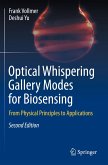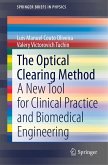This interdisciplinary book covers the fundamentals of optical whispering gallery mode (WGM) microcavities, light-matter interaction, and biomolecular structure with a focus on applications in biosensing. Novel biosensors based on the hybridization of WGM microcavities and localized surface plasmon resonances (LSPRs) in metal nanoparticles have emerged as the most sensitive microsystem biodetection technology that boasts single molecule detection capability without the need for amplification and labeling of the analyte. The book provides an ample survey of the physical mechanisms of WGMs and LSPRs for detecting affinity, concentration, size, shape and orientation of biomarkers, while informing the reader about different classes of biomolecules, their optical properties and their importance in label-free clinical diagnostics.
This expanded and updated second edition features a new chapter that introduces the reader to advanced in vivo biosensing techniques using WGM microcavities, looking at photothermal sensing, methods for trapping neutral atoms around WGM microcavities, and practical aspects of optoplasmonic sensing. The second Edition now provides a comprehensive introduction to the use of WGM microcavities in physical sensing which includes measurements with frequency combs, macro and micro (one atom) lasers, gyroscopes, optomechanical and parity-time-symmetric sensor devices.
Chapter-end problems round out this comprehensive and fundamental textbook, inspiring a host of up-and-coming physicists, bioengineers, and medical professionals to make their own breakthroughs in this blossoming new field. This textbook can be used for both introductory and advanced courses about the modern optics of optical microcavities.
This expanded and updated second edition features a new chapter that introduces the reader to advanced in vivo biosensing techniques using WGM microcavities, looking at photothermal sensing, methods for trapping neutral atoms around WGM microcavities, and practical aspects of optoplasmonic sensing. The second Edition now provides a comprehensive introduction to the use of WGM microcavities in physical sensing which includes measurements with frequency combs, macro and micro (one atom) lasers, gyroscopes, optomechanical and parity-time-symmetric sensor devices.
Chapter-end problems round out this comprehensive and fundamental textbook, inspiring a host of up-and-coming physicists, bioengineers, and medical professionals to make their own breakthroughs in this blossoming new field. This textbook can be used for both introductory and advanced courses about the modern optics of optical microcavities.








